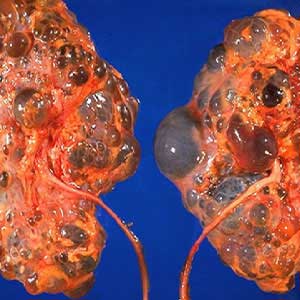Polycystic Kidney Disease doctor in Anantapur
Polycystic kidney disease is a medical condition that impacts the kidneys as well as other organs. It is characterized by the formation of clusters of fluid-filled sacs, known as cysts, within the kidneys, which disrupt their function in filtering waste from the bloodstream. The proliferation of these cysts results in kidney enlargement and may ultimately result in kidney failure and therefore require Polycystic Kidney Disease Treatment in Anantapur. Additionally, cysts can form in other organs, especially the liver.
Symptoms
Hypertension is the most prevalent indicator of polycystic kidney disease (PKD) as per PKD Specialist in Anantapur. Patients may sometimes experience headaches associated with elevated blood pressure, or healthcare providers may identify high blood pressure during a standard physical examination. Given that hypertension can lead to kidney damage, it is crucial to manage this condition effectively by Best Kidney treatment in Anantapur. In fact, addressing high blood pressure can significantly slow down or even avert the progression to kidney failure. Other symptoms may include

- Pain in the back or sides
- An increase in abdominal size
- Hematuria (blood in the urine)
- Frequent urinary tract or kidney infections
- Elevated blood pressure
- Palpitations or a pounding sensation in the chest.
Causes
Polycystic Kidney Disease (PKD) is a hereditary condition that is transmitted from parents to offspring through genetic material. Genes, which are fundamental units of heredity, are inherited in pairs—one from each parent—at the time of conception. These genes influence various traits, including physical attributes such as hair and eye color, as well as the potential for developing certain medical conditions.
A genetic disorder may arise if one or both parents transmit abnormal genes to their child. This transmission can occur through mechanisms known as dominant inheritance or recessive inheritance.
- Dominant inheritance - In cases of dominant inheritance, if one parent possesses the disease and transmits an abnormal gene to the child, the child has a 50% probability of inheriting the condition. This risk remains constant for each child, irrespective of the number of siblings who may also be affected.
- Recessive inheritance - Conversely, recessive inheritance occurs when both parents carry the abnormal gene, and each passes it on to the child. In this scenario, the likelihood of the child developing the disease is 25%.
Currently, there is no established diet that can prevent the formation of cysts in individuals diagnosed with polycystic kidney disease. Engaging in physical exercise is encouraged for individuals however, activities that may pose a risk to kidney health, such as contact sports, should be avoided. It is crucial to ensure adequate hydration during any form of physical activity to prevent excessive dehydration. For more information, consult Best Nephrologist in Anantapur, Dr. M. Surendra Babu for more information.
